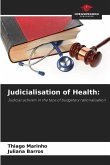We have seen, historically, the transition from a predominantly sovereign State to one that sought the citizen's point of view. The concern was to protect the citizen from an absolute state power. With the emergence of the first democratic states, the source of power resided in the will of the people, and the movements that culminated in the insertion of health as a fundamental right express the importance of this right to human dignity and citizenship. In this context, the state, in turn, is the guarantor of health and the constitutional text assigns it the commitment to ensure this right and, to ensure that health services are provided in the form of the Constitution and other international standards, the judiciary can (and should) promote the accountability of those who undermine access to health services in a broad manner.








